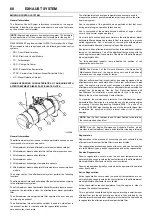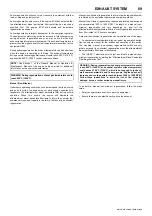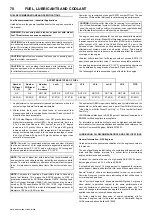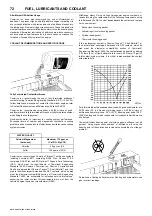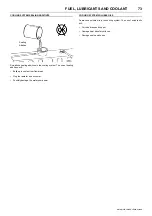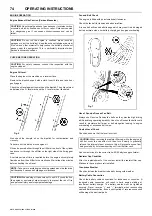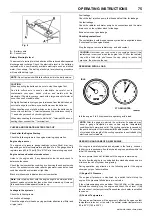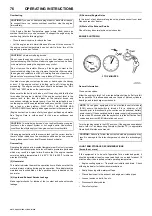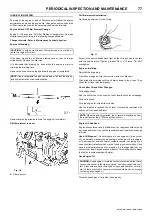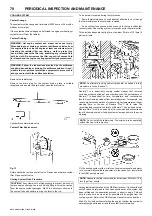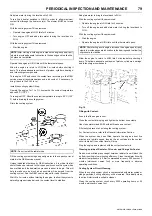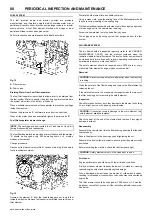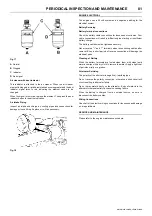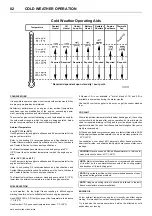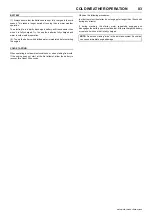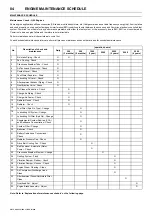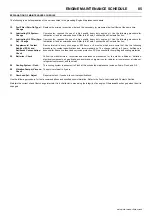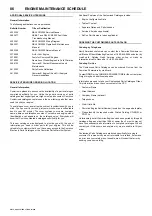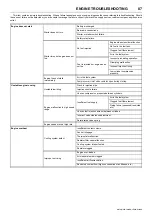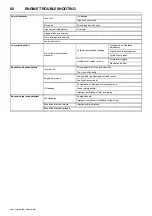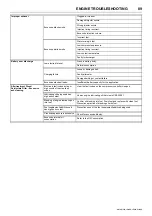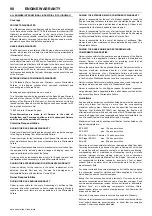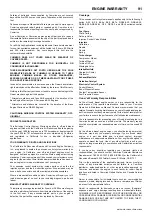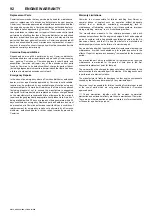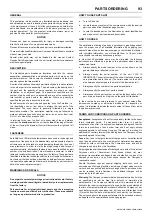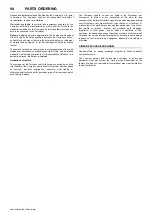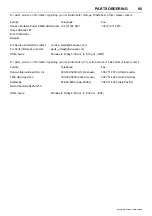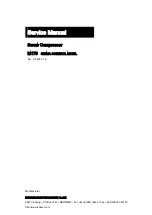
82
COLD WEATHER OPERATION
9/275, 9/305, 12/250, 17/240, 21/220
COLD WEATHER
It is possible to operate engines in extremely cold environments if they
are properly prepared and maintained.
Satisfactory performance of an engine in low ambient temperature
conditions requires modification of the engine, surrounding equip-
ment, operating practices and maintenance procedures.
The correct engine coolant lubricating oil and fuels
must
be used for
the cold weather range in which the engine is being operated. Below
are the recommendations for these critical engine fluids:
Ambient Temperature
0 to -32°C (32 to -25°F)
Use 50-percent ethylene glycol antifreeze and 50-percent water for the
engine coolant mixture.
Refer to Lubricating Oil recommendations and Specifications and
Coolant Recommendations and Specifications in the Fuels, Lubricants
and Coolants Section for the correct specifications.
The Diesel fuel
must
have maximum cloud and pour points 6°C
(10°F) lower than the ambient temperature in which the engine oper-
ates.
-32 to -54°C (-25 to -65°F)
Use 60-percent ethylene glycol antifreeze and 40-percent water for the
engine coolant mixture.
Refer to Lubricating Oil recommendations and Specifications and
Coolant Recommendations and Specifications in the Fuels, Lubricants
and Coolants Section for the correct specifications.
The Diesel fuel must have maximum cloud and pour points 6°C (10°F)
lower than the ambient temperature in which the engine operates.
FUEL SELECTION
In cold weather, the fuel might freeze resulting in difficult engine
starting; therefore, select a suitable fuel for such engine operation.
Use ASTM 975 No. 2-D fuel if you expect the temperature to be above
-7°C (20°F).
Use Number 1-D if you expect temperatures below -7°C (20°F).
If Number 1-D is not available, a "winter" blend of 1-D and 2-D is
available in some areas during the winter months.
Check with your fuel supplier to be sure you get the correct blended
fuel.
COOLANT
Where the ambient temperature falls below freezing point, the cooling
system should be drained after engine operation, but to eliminate the
need for repeated draining, refilling and to provide all year protection
against corrosion, the use of anti-freeze solution throughout the year is
highly recommended.
All Doosan portable compressor engines are factory filled with a 50/50
Ethylene glycol base antifreeze/water mix. which provides protection to
-33°C (-27°F)
Concentrations over about 65% adversely affect freeze protection,
heat transfer rates, and silicate stability which may cause water pump
leakage.
ENGINE OIL
At low ambient temperatures, engine oil viscosity can affect engine
starting. It is important to use the correct grade of oil as recommended.
Try to position the compressor where it will not be affected by cold
winds when not running.
Cold Weather Operating Aids
Temperature
Coolant
Heater
Oil
Heater
Under-
hood Air
Battery
Heater
Radiator
Shutters
Engine
Enclosure
Thermatic
Fan
Sug
ge
st
ed
Required Required*
Required
Required
Required
Required
Required
* Required dependent upon viscosity / pour point.
CAUTION: Never exceed a 60/40 antifreeze/water mix. (which pro-
vides protection to about -50°C (-58°F).
NOTE:
Methyl alcohol base antifreeze is not recommended because
of its effect on the non-metallic components of the cooling system
and because of its low boiling point.
NOTE:
High silicate antifreeze is not recommended because of caus-
ing serious silica gelation problems.
NOTE:
Usage and mixing ratio etc. should be followed to the anti-
freeze manufacture's recommendations.

